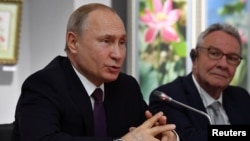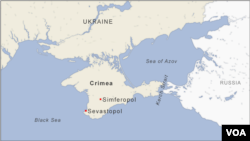Russian flags flew across Crimea's main city Simferopol on Monday to mark the fifth anniversary of the peninsula's annexation from Ukraine, a move condemned by the West but celebrated by most Russians.
President Vladimir Putin was to take part in celebrations in the Black Sea peninsula, launching a new power station and meeting members of the public, the Kremlin said.
Moscow took over Crimea in March 2014 after months of tensions with Kyiv following the ouster of a pro-Russian leader.
Russia said it was righting a historic wrong — Soviet leader Nikita Khrushchev had transferred Crimea to Ukrainian control in 1954 — and the move resulted in a major boost to Putin's popularity.
But the takeover was denounced by Kyiv and the West as an annexation and, along with Moscow's support for separatist forces in Ukraine's east, has led to wide-ranging sanctions against Russia.
In Russia, March 18 has been officially proclaimed the "Day of Crimea's Reunification with Russia" and celebrated with events across the country. In Crimea, it is a public holiday.
Authorities set up a stage on Simferopol's main square for the celebrations. Posters that read "Five years of Crimea returning to its native land" hung on shop windows and public transport.
"There is a feeling of newness, of independence, of freedom," retired teacher Valentina Dorozhko told AFP. She said she felt "reborn" when Russia took over.
Crimean Marina Tishchenko said that if the peninsula held a referendum today, "even more people would vote to join Russia".
But Oleg Ivanov, a man in his 40s, called for Putin to change course.
"If we have sanctions imposed on us, then you need to sit down, negotiate and change something," he told AFP. "And if there's no progress, then it's time for someone else to have a go."
'Part of Russia forever'
Putin signed an agreement on March 18, 2014, with local representatives to make Crimea part of Russia, two days after a referendum condemned by Kiev and the West as illegitimate.
Pro-Kremlin media on Monday carried reports of improvements on the peninsula under Russian rule.
"There is growing understanding in the world that Crimea is part of Russia and will be forever," Valentina Matviyenko, the speaker of Russia's upper house of parliament, wrote in a column for newspaper Izvestia.
But the liberal press painted a more sombre picture, saying the takeover had made Russians poorer and more isolated from the world.
The takeover prompted euphoria and a wave of patriotism in Russia, but five years later Crimea has "stopped being a source of political benefit" for authorities, liberal newspaper Novaya Gazeta said.
According to a survey published by the Centre for Public Opinion (FOM) in early March, only 39 percent of Russians believe the annexation brought Russia more good than harm.
In 2014, that figure was 67 percent.
New sanctions
Last week, the United States, Canada and the European Union slapped new sanctions on more than a dozen Russian officials and businesses in response to Moscow's "continued aggression in Ukraine".
Ukrainian President Petro Poroshenko, who is facing a difficult election this month, vowed that Crimea would return to Ukraine if he was re-elected.
Kyiv's Foreign Minister Pavlo Klimkin told AFP ahead of the anniversary that the Russian annexation had left Crimea in limbo.
"Under Russian occupation Crimea is going nowhere, it has no future," he said.
"All these five years there has been an atmosphere of both open and hidden terror against the people of Crimea and international law."
The Crimean Tatars, a Muslim-majority community that is largely opposed to the annexation, have faced pressure from Russian authorities.
Russia has banned the Mejlis, the Crimean Tatars' elected assembly which resisted Russian rule, denouncing it as extremist.
"Crimea was taken away from the Crimeans, their homeland was taken away from them," Klimkin said.
Ukraine "feels pain for this every day."

